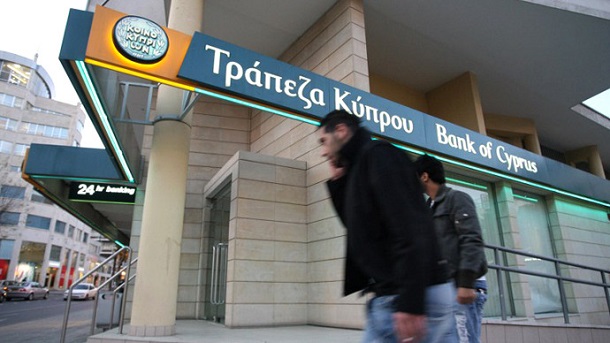Cyprus may make its citizens shoulder a 12.5-percent crisis tax on savings larger than €100,000, while reducing the tax for smaller deposits to 3 percent.
Officials in Cyprus are reportedly trying to renegotiate a eurozone bailout deal in order to soften the impact of a levy on smaller savers.
Authorities had planned a 6.7% tax on deposits under 100,000 euros (£85,454), triggering queues at cash machines as people in Cyprus rushed to withdraw their money.
But the country’s government is thought to be discussing cutting the tax rate to 3% while raising the rate for deposits over 100,000 euros from 9.9% to 12.5%.
In exchange for the levy, Cyprus will receive 10bn euros (£8.54bn) in aid to help recapitalise banks.
Cypriot President Nicos Anastasiades, who was elected just three weeks ago, said the island had to accept a painful compromise or face bankruptcy.
In a televised address, he said the bailout “will eventually stabilise the economy and lead it to recovery”.
Monday is a national holiday in Cyprus and measures need to be approved before banks open again on Tuesday.
Depositors in the eurozone’s weaker economies have been unnerved by the levy, with investors fearing it will set a precedent that could reignite market turmoil.
The last minute discussions are allegedly aimed at appeasing ordinary Cypriots who are about to share a major part of the anti-crisis burden imposed on Cyprus by the European Central Bank.
Cyprus became the fifth country to ask for immediate aid from the Eurozone. But in a drastic twist from the previous cases, the European finance ministers demanded Cyprus seize a significant portion of all deposits in the country’s banks in order to secure a €10 billion bailout.
The original agreement suggested 9.9 and 6.7 per cent levies on deposits above and below the €100,000 threshold respectively.
Their uncertainty could be reflected when European markets open later, with the euro having already seen sharp falls in Asia.
British government and military personnel in Cyprus will be protected from any levy on their bank deposits.
Foreign Secretary William Hague told that Britain had been “separated” from contributing towards the bailout, adding that 3,000 Britons in the country would not suffer in the proposed raid on bank savings.
The tax on deposits in Cyprus, which accounts for only 0.2% of the eurozone’s economy, is expected to raise up to 6bn euros (£5bn).
Those affected will include rich Russians with deposits in Cyprus and Europeans who have retired to the island, as well as Cypriots themselves.
The size of foreign deposits in Cyprus – estimated at 37% of the total – was one reason the eurozone agreed to the tax on savings.
It will apply to all deposits held in banks within Cyprus, including an estimated 2bn euros (£1.75bn) of British money, according to the European Central Bank.
It will not affect deposits held in the UK branches of Cypriot banks, such as Bank of Cyprus, whose UK subsidiary is regulated by the Financial Services Authority.
However, Laiki Bank UK said on its website: “Your eligible deposits with Laiki Bank UK are protected up to a total of 100,000 euro (£87,000) by the Cyprus Deposit Protection Scheme and are not protected by the UK Financial Services Compensation Scheme.
“Any deposits you hold above the 100,000 euro limit are not covered.”
Cypriot banks lost 4.5bn euros (£3.8bn) – equal to a quarter of the island’s gross domestic product – when eurozone leaders decided to write off Greek debt last year.
As part of its bailout deal, corporate tax will rise from 10% to 12.5%, while state assets will be sold off to help balance the public finances.
Cuts to government worker salaries and pensions have already been approved.
[adrotate group=”16″]


